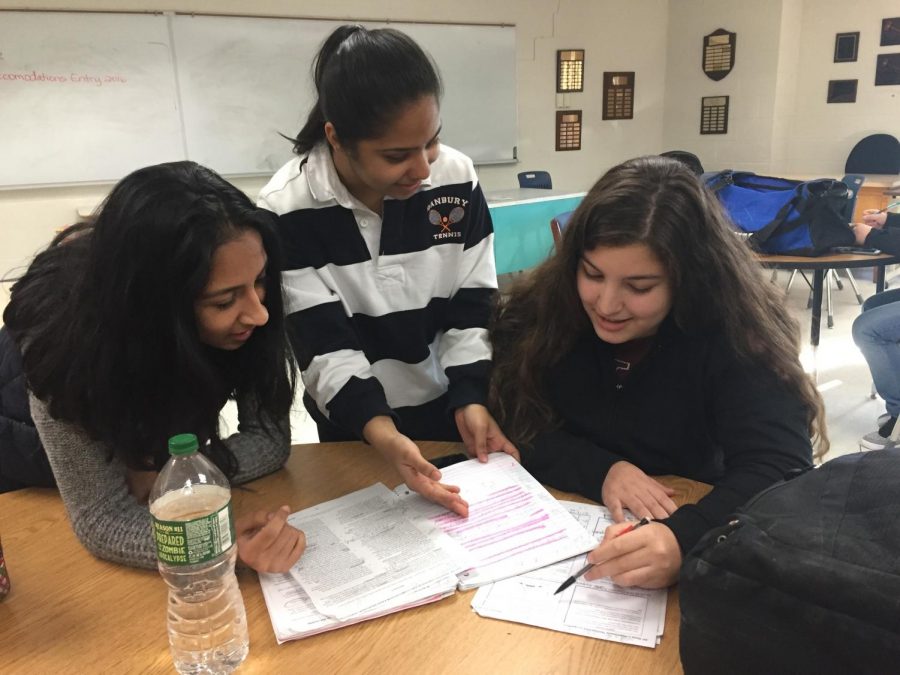Student volunteers staff tutoring center after budget cuts
Students working at the tutoring center.
February 16, 2018
Due to budget constraints, professional tutors are no longer available to students in the tutoring center this year.
Despite the cuts, counselor Michael Boucher, who helps oversee the tutoring center, worked to keep it open and helped organize volunteers to tutor.
The tutoring center is open during all lunch periods for students who need extra help with their academics. The center opened seven years ago and used to be staffed with three to six paid professionals, or “interventionists,” per period, each with their own area of expertise. Spanish interpreters were also provided.
The interventionists were paid for by a grant made available by the state Department of Education, according to associate principal Meghan Martins. The district reallocated funding from the grant, so the school no longer receives money to support the interventionists, Martins explained. This year marks the first year in several that the tutoring center is staffed by students, along with an adult supervisor.
“We wanted to keep it open because it’s a great tool to help our kids that might be struggling in class,” Boucher said.
Elise Tobin, the National Honor Society advisor at the time, and Jessica Javier, Math Honor Society advisor, were both instrumental in recruiting student volunteers from the honor societies. The honor students earn volunteer hours by tutoring at the center.
“One of the initiatives NHS has really worked towards is ensuring that students have the academic support they need,” Tobin said. “And NHS students are always willing to put themselves out there and help out.”
Additionally, walk-ins are no longer allowed this year. Students must be scheduled by their counselor or make a request to be scheduled just like a regular class. The administration wanted to see how it goes with just the volunteer tutors and assigned students before before allowing walk-ins.
This new policy has led to a decrease in the number of students seeking help from tutors. Just under 50 students are scheduled in the tutoring center this year, leaving many of the student-tutors idle.
Senior Kevin Fong, who volunteers as a math tutor twice a week, has only tutored a couple of students.
“I feel like students should have the option of a walk-in. Once they feel comfortable enough in the class, they shouldn’t have to come every day,” Fong said.
Senior Joy Hendrix, a chemistry tutor, agreed.
“A lot of times you don’t necessarily know that you have trouble with a concept until after a class or until you’re at home doing homework,” Hendrix said. “And if they find that kids are just hanging out there, they can easily kick them out. The adult is there for a reason.”
Walk-ins haven’t been completely ruled out, though. Semester one was just a trial period to work out the kinks. The administration wanted to be careful not to overwhelm the adult supervisor on duty with too many kids.
“It’s not out of the woods yet,” Boucher said. “There may be [walk-ins this] semester, but that’s up to [the administration]. It’s growing and hopefully we’ll add more to that for the second semester.”
Tobin also had confidence in whatever decision the administration makes.
“I think one thing that’s good about our school is that we’re willing to try new things,” Tobin said. “If the walk-in policy makes sense, then I think the school is pretty flexible in terms of allowing something.”
Despite the decline of students being tutored, attendance for the student volunteers has been steady.
“Their attendance has been excellent,” Boucher said. “They’ve been coming every day.”
Most students and teachers are still in favor of the idea of student-tutors. Many believe it fosters more social interaction.
“I think that because I just went through the same things they did last year, I understand the problems that they have better,” Hendrix said. “It’s a little bit less intimidating. It’s easier to ask a peer for help than it is to ask a teacher sometimes.”
Fong is also in favor of the student tutoring and hopes to continue into the second semester.
“I feel like I can connect with them on a personal level,” Fong said. “It’s really important to help the person being tutored feel comfortable with the struggles they’re having.”
Even so, there is no definitive answer as to whether the student tutoring program is the perfect solution.
“The reports I’m hearing are mixed,” Tobin said. “We have some tutors that are helping students out a lot and some where they’re not helping as much, not because they don’t want to, just because some students want to reach out for help more than others. So we’re hoping to continue to get the tutors to just be working for the period.”
A survey with questions about their experience has been given to the students that are scheduled in the tutoring center.
“We’re analyzing some data right now on the effectiveness of it to see if we can make changes moving into the second semester,” Boucher said.
Ideally, the student tutoring program will continue into the second semester with some improvements. No specific changes have been announced yet.
“Obviously it would be nice to have paid professionals, but this is a great tool to get kids working with other students and build comradery,” Boucher said. “I hope it’s something that continues.”




















